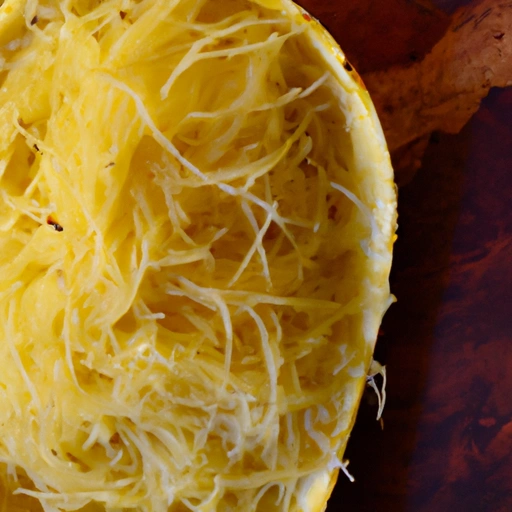Spaghetti Squash
Description

Spaghetti Squash is a distinctive variety of winter squash that stands out for its unique texture and shape once cooked. When the flesh is scraped with a fork, it separates into long, spaghetti-like strands, which is how it gets its name. It has a mild, slightly sweet flavor and is a versatile ingredient in many recipes. Spaghetti Squash is rich in nutrients while being low in calories, making it a popular substitute for traditional pasta among health-conscious individuals and those following low-carbohydrate or gluten-free diets.
Common uses
Spaghetti Squash is commonly used as a pasta substitute in a variety of dishes, from casseroles to salads. Its ability to take on flavors makes it an ideal base for an assortment of sauces and toppings. It is also enjoyed simply seasoned with herbs and spices, drizzled with olive oil, or topped with cheese. In addition to savory dishes, Spaghetti Squash can be incorporated into sweet recipes, such as pies or cakes, showcasing its versatility.
Nutritional value
Calories
Spaghetti Squash is known for being low in calories, with approximately 31 calories per 100 grams (3.5 ounces) or 42 calories per cup (155 grams).
Protein
It contains about 0.64 grams of protein per 100 grams (3.5 ounces) or about 1 gram per cup (155 grams).
Fat
Spaghetti Squash is low in fat, with approximately 0.57 grams per 100 grams (3.5 ounces) or 0.5 grams per cup (155 grams).
Carbohydrates
The carbohydrate content is about 6.91 grams per 100 grams (3.5 ounces) or 10 grams per cup (155 grams), with a good portion of that being dietary fiber.
Vitamins
It is a good source of vitamins, including Vitamin C, B vitamins (especially B6 and niacin), and Vitamin A.
Minerals
It also provides essential minerals such as potassium, magnesium, and calcium.
Health benefits
Consuming Spaghetti Squash can aid in weight management due to its low-calorie count and high fiber content, which helps promote feelings of fullness. It also contributes to a healthy digestive system and may reduce the risk of heart disease with its fiber, potassium, and vitamin content. The antioxidants found in Spaghetti Squash, such as beta-carotene, have potential anti-inflammatory properties and may help protect against certain types of cancer.
Potential risks
As a whole, Spaghetti Squash is safe for most people to eat. However, those with allergies to Cucurbitaceae family vegetables (like cucumbers or melons) should be cautious. Additionally, due to its high potassium content, individuals with kidney problems should consult with a healthcare provider before consuming it in large amounts.
Common recipes
Popular recipes include Spaghetti Squash boats filled with various toppings, Spaghetti Squash Pad Thai, and it being used as a base for meatballs and marinara sauce. It's also a common ingredient in vegetarian and vegan dishes where it replaces traditional pasta.
Cooking methods
Spaghetti Squash can be baked, microwaved, boiled, steamed, or slow-cooked. The strands can be eaten as is or lightly sautéed to enhance the texture.
Pairing with other ingredients
It pairs well with a variety of flavors, from tomato-based sauces and pesto to creamy alfredo, as well as with spices, herbs, meats, and other vegetables.
Summary
Spaghetti Squash is a nutritious and versatile ingredient that can be used in an array of recipes, serving as a healthier alternative to traditional pasta. Its low calorie and high nutrient profile make it a favorable choice for those looking to maintain a balanced diet, and its compatibility with a variety of cuisines allows for creative culinary exploration.